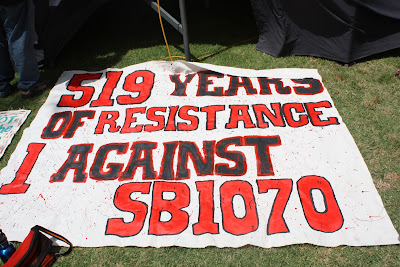Standing in solidarity with indigenous migrants
By Shadi Rahimi, Today correspondentStory Published: Jun 4, 2010
PHOENIX – As an estimated 100,000 people marched six miles May 30 to protest Arizona’s new immigration law, they were led by Lakotas, Paiutes, Yavapai-Apache, Tohono O’odham, Akimel O’odham, and other tribal members.
Those in front held a banner that read, “Lakota-Nation: America Was Built With Stolen Land. No Border. No Boundaries.”
Shannon Rivers, an Akimel O’odham who organized the march, said they were marching in solidarity with “brothers and sisters” crossing the borders, and for the right of mobility for indigenous people. Rivers said Senate Bill 1070 – which would make the failure to carry immigration documents a crime and give the police the power to detain anyone suspected of being in the country without citizenship – is a racist bill that should be repealed.
“We, as indigenous people, have been dealing with immigration since the Spaniards and Europeans came. We need to remind them, they too are immigrants. This is the first of many bills to come in the age of xenophobia and post-9/11 laws.”
A majority of those crossing the border from Central America to the U.S. are indigenous people who have been negatively affected by the North American Free Trade Agreement, Rivers said, and U.S. industries that have displaced them from homelands, extracted their resources, and contaminated traditional means of income and sustenance, such as corn.
At a juvenile detention center in Nogales, Mexico, just south of the Arizona border, most of the youth who are deported by U.S. Immigration and Customs Enforcement are from pueblos in southern Mexico.
Youth ages 10 to 17 sat on the concrete floor of the courtyard at the detention center, talking and joking as they waited for family members to pick them up.
Some only spoke indigenous languages and could not communicate with the Spanish-speaking staff. Those who could said they tried to cross the border to the U.S. to find work. Others were looking for parents who had crossed successfully.
Only one youth knew where their parent was. She was 14 and was trying to reach her mother in Pennsylvania. She was caught by ICE near the border of Arizona. When she refused to remove her shoelaces, they took her 700 pesos, she said. She and other youth were taken to a U.S. detention center where they were piled into a cold room for three nights, she said.
The girl plans to cross again, as did most other youth at the center. One 15-year-old boy said he planned to try again that night, after he was picked up by family.
Many are from Oaxaca, Puebla, Guerrero, Chiapas, Michoacan, Veracruz and Sonora – all communities that have been affected by deforestation, contamination of corn and by U.S.-operated factories, the loss of lands or the devaluing of the peso since NAFTA passed.
“There’s lots of kids from the pueblos, who are Indian,” a program director named Isabel said through a translator. “They are hard workers who just want a better life.”
Such stories are common, said a staff member named Ruben. “We hope you can do something about the way your government treats our children.”
Across the Arizona border, on the Tohono O’odham Reservation, tribal member Mike Wilson has been trying to help migrants crossing the border.
At Saturday’s protest, Wilson brought a map showing the locations of 17,555 migrant deaths that have occurred over the past decade.
“That’s why I put out water barrels for the migrants, so that they do not die. At least 100 migrants who cross through Tohono O’odham lands die every year from dehydration.”
The Tohono O’odham government recently took a stand against S.B. 1070, but Wilson criticized his government for their lack of “humanitarian aid.” They seized his four water stations in the Baboquivari District, which he said is the “deadliest migrant trail in the U.S.”
Today, about nine O’odham communities in Mexico are separated by the U.S./Mexico border. O’odham must produce passports and border identification cards to enter the U.S.
“On countless occasions, the U.S. Border Patrol has detained and deported members of the Tohono O’odham Nation who were simply traveling through their own traditional lands,” according to the O’odham Nation. “Border officials are also reported to have confiscated cultural and religious items, such as feathers of common birds, pine leaves or sweet grass.”
Such restrictions on the movement of indigenous people are why David “Smoky” Daniels traveled from Los Angeles to attend the protest. He rode a bike on which he taped a sign that read “Yaqui Nation.” As a tribal member, Daniels said he was there to fight against racist legislation.
“I want to nip this in the bud, it’s like a cancer and I don’t want it to spread to California. My people welcome all, unless you came to fight. That’s why I’m here, to fight what they’re doing. It is shameful.”







No comments:
Post a Comment